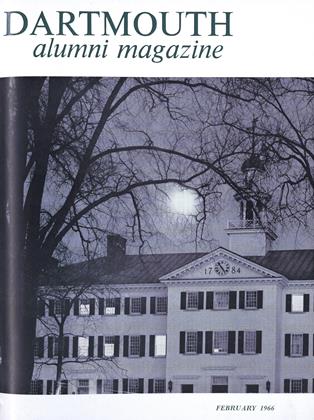LAST month in Princeton, N. J., Joseph D. Harris, Associate Professor of Physics and Lecturer in Biochemistry, became the fifth Dartmouth faculty member in as many years to receive a national award given in recognition of excellence in teaching.
Professor Harris received the E. Harris Harbison Award for Distinguished Teaching from the Danforth Foundation of St. Louis. In an address at the dinner honoring the eight award winners for 1966, Princeton's President Robert F. Goheen discussed the importance of such recognition for teaching. He said:
"In these days of concern about the bleakness of the impersonal university, it is heartening that the Danforth Foundation has taken leadership in recognizing the crucial role of teachers in higher education.
"The nation cannot afford to have its best minds apart and aloof from the students who throng our university halls. These minds must connect with the young minds who are to follow them."
He went on to note two particular attributes of the successful teacher: "One is an ability to awaken and stimulate delight in the uses of the mind. The second is attention to the effort to do so, together with a belief in its value to the student in his own right."
The Harbison Awards consist of grants in the amount of the faculty member's salary, plus benefits, for two terms. They are intended to permit those honored "to pursue interdisciplinary studies and inquiries into the relationship of their subject matter with philosophical and religious thought." While recognizing unusual accomplishments in college teaching, they are given only to those who do not slight other responsibilities that competent teacher-scholars bear.
In 1963, the first year the awards were given and when they were known as the Danforth Associate Awards, Prof. Fred Berthold Jr. '45 of the Religion Department was one of five winners. They were feted in St. Louis and appeared on a nationally televised program, Meet theProfessor.
Another outstanding Dartmouth teacher honored the year before was Francis W. Sears, Appleton Professor of Natural Philosophy. For "notable contributions to the teaching of physics" he received the Oersted Medal from the American Association of Physics Teachers. He was cited as a notable teacher, as author of textbooks that have sold well over a million copies, and as co-discoverer of what is known in physics as the "Debye-Sears effect."
Two other Dartmouth faculty members, both of the Chemistry Department, have been honored by the Manufacturing Chemists Association.
In 1964, John H. Wolfenden, New Hampshire Professor of Chemistry, was one of three winners of the Association's College Chemistry Teacher Awards which include a citation and a $1000 prize. The judges reported that they had "considered convincing evidence that Dr. Wolfenden has been personally responsible over a period of years for arousing in students a genuine interest in chemistry and inspiring them to serious intellectual effort in studying that field and for developing that interest into continued education."
The second chemist who won this award was Walter H. Stockmayer, Class of 1925 Professor of Chemistry, who was honored in the summer of 1960.
And just to show that he hasn't neglected the scholar side of the teacher-scholar concept, Professor Stockmayer last month received the $1500 American Chemical Society Award in Polymer Chemistry.
Joseph D. Harris, Associate Professor of Physics, whoreceived a Harbison Award for excellence in teaching.
John H. Wolfenden, New Hampshire Professor ofChemistry, whose teaching was saluted in 1964.
Walter H. Stockmayer, Class of 1925 Professorof Chemistry, who was honored for teaching in1960 and for research in polymers last month.
Fred Berthold Jr. '45, Professor of Religion, received oneof the first Danforth teaching awards three years ago.
In 1962 Prof. Francis W. Sears, since retired, was the recipient of the Oersted Medal for his "notable contributionsto the teaching of physics" and for his college textbooks.
 View Full Issue
View Full Issue
More From This Issue
-
 Feature
FeatureThe Antileadership Vaccine
February 1966 By JOHN W. GARDNER -
 Feature
FeatureThe Computer at Dartmouth
February 1966 By John G. Kemeny -
 Feature
FeatureAlumni College Topics Set
February 1966 -
 Article
ArticleThe Undergraduate Chair
February 1966 By LARRY GEIGER '66 -
 Class Notes
Class Notes1914
February 1966 By ELMER ROBINSON, CHARLES S. BATCHELDER, MARTIN J. REMSEN -
 Class Notes
Class Notes1920
February 1966 By GEORGE H. MACOMBER, ALBERT W. FREY, H. SHERIDAN BAKETEL JR.
Features
-
 Feature
FeatureBicentennial Draws Unusual Gifts
OCTOBER 1969 -
 Cover Story
Cover StoryJames Forrestal 1915
NOVEMBER 1990 -
 Feature
FeatureWHAT STUDENTS SAY
Nov/Dec 2000 -
 Feature
FeatureWORDS AND PICTURES MARRIED The Beginnings of DR.SEUSS
April 1976 By Edward Connery Lathem -
 Feature
FeatureHard times in the pressure-cooker
DECEMBER 1981 By Mary Ellen Donovan -
 Feature
FeatureMoosilauke Area Doubled
NOVEMBER 1966 By Robert S. Monahan '29


